Choosing a baby name is a big decision, but parents are being reminded to check one small detail before finalizing it: initials. Viral Instagram and TikTok videos show how overlooked letter combinations can turn into lifelong jokes.
Roses are red, violets are blue. Which of these pretty flower names is growing on you?
If you’re like most parents today, then names like Violet, Lily and Ivy are at the top of your list — after all, they were the only flower names for girls to appear in the Social Security Administration’s top-50 for 2024.
Chloe, which means “young green shoot” or “blooming” in Greek, also landed in the top-50.
RELATED: 65+ Trendy Nature Girl Names That Celebrate Earth’s Beauty
Other pretty flower names for girls to rank high last year include Lillian, Leilani, Iris, Daisy and Liliana — all of which ranked in the SSA’s top-100.
And let’s not forget about Cattleya, which entered the top 1,000 for the first time ever and was among the girl names to see the biggest increase in popularity from 2023 to 2024, per the SSA.
But don’t stop your search there. Flower girl names have been popular for decades.
Florence, which means “blossoming” in Latin, was the seventh-most popular girl’s name in the U.S. in 1900, according to the SSA. Lillian and Rose also ranked in the top-20 that year.
Likewise, the name Myrtle — referring to the evergreen shrub with small, white, star-shaped flowers — ranked 32nd in 1900, while Lillie, Laura and Viola also cracked the top-50.
If you’re looking for pretty flower names for girls, then you’ll love the baby name list we curated for you below!
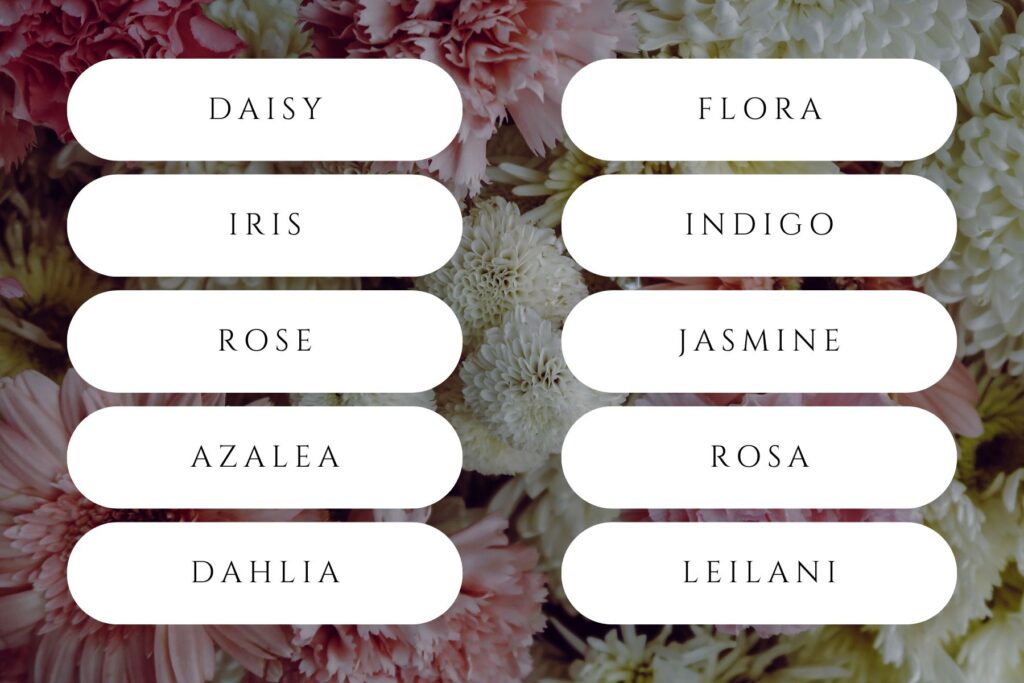
Daisy
Origin: Old English
Meaning: Day eye
Daisy, pronounced DAY-zee, comes from the Old English phrase dægeseage meaning "day's eye," referring to how the flower opens at dawn. The flower is known for its white petals and sunny center.
Iris
Origin: Greek
Meaning: Rainbow; Colorful flower
Iris, pronounced EYE-ris, comes from Greek mythology where Iris was the goddess of the rainbow and messenger of the gods. The name shares its origin with the colorful flower, which was named after the goddess due to its many colors.
Rose
Origin: Latin; English
Meaning: Rose flower
Rose, pronounced ROHZ, derives from the Latin word rosa, referring to the rose flower known for its beauty and fragrance. Roses are universally recognized symbols of love, romance and passion.
Azalea
Origin: Greek
Meaning: Dry; Parched; Funnel-shaped flower
Azalea, pronounced uh-ZAY-lee-uh, derives from the Greek word azaleos meaning "dry" or "parched," referring to the woody nature of the plant. They’re unique for their funnel-shaped, often fragrant blossoms.
Dahlia
Origin: Latin; Swedish; Old Norse
Meaning: Dahl’s flower; Flower valley
Dahlia, pronounced duh-LEE-uh or DAH-lee-uh, comes directly from the name of the flower, which was named after the Swedish botanist Anders Dahl. His last name derives from the Old Norse word dalr, meaning “valley.”
Flora
Origin: Latin; Roman
Meaning: Flower goddess
Flora, pronounced FLOR-uh, comes from the Latin word flos and floris, meaning “flower.” In Roman mythology, Flora was the goddess of flowers and spring, and the wife of Zephyr, the west wind.
Indigo
Origin: English; Greek
Meaning: Purplish-blue flower; From India
Indigo, pronounced IN-dih-goh, comes directly from the English word indigo, referring to the purplish-blue dye or color that was originally sourced from the flower of the same name. It comes from the Greek name Indikon, meaning “from India.”
Jasmine
Origin: English; Arabic; Persian
Meaning: Star-shaped flower
Jasmine, pronounced JAZ-min, derives from the Arabic and Persian word yāsamīn, referring to the climbing or bushy shrub with glossy green leaves and small, star-shaped, highly fragrant flowers.
Rosa
Origin: Latin
Meaning: Red flower; Fame
Rosa, pronounced ROH-zuh, comes directly from the Latin word rosa, referring to the red flower that’s universally recognized as a symbol of love, romance and passion. It can also come from the Germanic name Roza, meaning “fame.”
Leilani
Origin: Hawaiian
Meaning: Heavenly flower; Heavenly child
Leilani, pronounced lay-LAH-nee, is composed of the Hawaiian elements lei, meaning “flowers” or “child,” and lani, meaning “heaven” or “sky.” It’s often interpreted as “heavenly flower” or “heavenly child.”
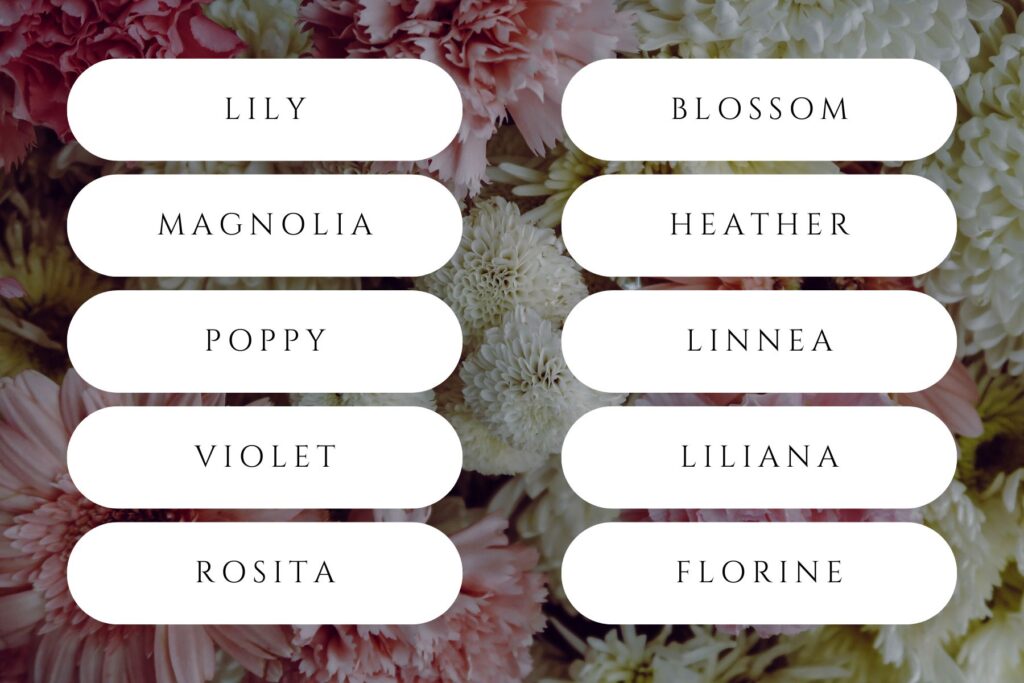
Lily
Origin: English; Latin
Meaning: Lily flower
Lily, pronounced LIL-ee, comes directly from the English word for the flower, ultimately derived from the Latin word lilium. Lilies are primarily known to symbolize love, purity, fertility and rebirth in many cultures.
Magnolia
Origin: Latin; French
Meaning: Magnol’s flower; Ancient flower
Magnolia, pronounced mag-NOH-lee-uh, comes from the flowering tree named after French botanist Pierre Magnol (1638-1715). Fossils have revealed that magnolia plants existed at least 20 million years ago.
Poppy
Origin: Latin; English
Meaning: Bright red flower; Remembrance
Poppy, pronounced POP-ee, comes directly from the English word for the bright red flower, which derives from the Latin word papaver. It became a symbol of remembrance after World War I and we celebrate National Poppy Day every year on the Friday before Memorial Day
Violet
Origin: Latin
Meaning: Blue-purple color; Purple flower
Violet, pronounced VYE-uh-lit, comes from the English word violet and Latin word viola, referring to the purple-blue color or flower known for their charming, delicate petals that come in purple, blue, yellow, and white.
Rosita
Origin: Spanish; Latin
Meaning: Little rose
Rosita, pronounced ROH-zee-tuh, is a Spanish diminutive of Rosa, which ultimately comes from the Latin word rosa, referring to the woody perennial flowering plant often given as a gift between two lovers.
Blossom
Origin: Old English
Meaning: Flower; Bloom
Blossom, pronounced BLAH-sum, comes directly from the English word blossom (derived from the Old English word blostma), referring to the flower of a flowering plant. It was given to 101 baby girls in 2024.
Heather
Origin: English
Meaning: Heather; Flowered heath
Heather, pronounced HETH-er, comes from the Middle English word hather, referring to the hardy evergreen shrub with tiny purple, pink, or white flowers that are known to cover hillsides in Scotland and England. Its scientific name is Calluna vulgaris.
Linnea
Origin: Latin; Swedish
Meaning: Twinflower
Linnea, pronounced lin-NAY-uh or LIN-ee-uh, is derived from the Latin scientific name of the twinflower (Linnaea borealis), which was named after the famous Swedish botanist Carl Linnaeus.
Liliana
Origin: English; Latin
Meaning: Lily flower
Liliana, pronounced lil-ee-AH-nuh, is believed to be an elaborated form of Lily, which derives from the Latin word lillium, referring to the lily flower. Lilies often symbolize love, purity, fertility and rebirth.
Florine
Origin: French; Latin; Roman
Meaning: Flower; Blossom
Florine, pronounced FLOR-een, is the French feminine form of Florinus and Florus, which comes from a Roman cognomen derived from the Latin word flos and floris, meaning “flower,” “blossom” or “flourish.”
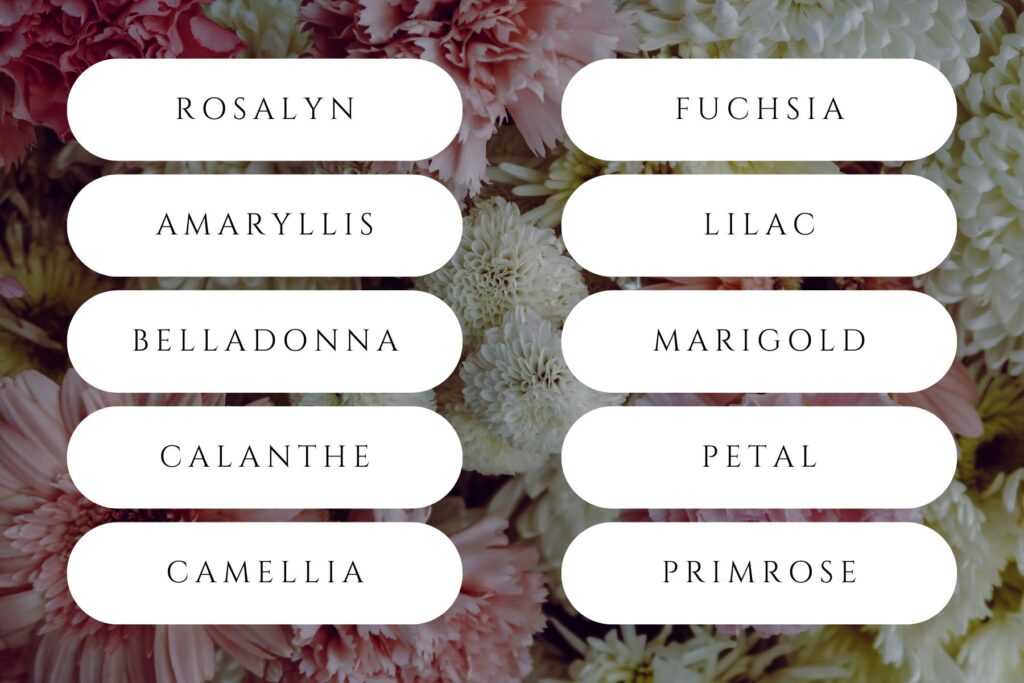
Rosalyn
Origin: Latin; Old German
Meaning: Pretty rose; Gentle horse
Rosalyn, pronounced RAH-zuh-lin or ROH-zuh-leen, is a variant of Rosaline and Rosalind, meaning “gentle horse” in Old German, but it can also be a combination of the Latin word rosa, meaning “rose,” and suffix lyn, meaning “pretty.”
Amaryllis
Origin: Greek; English
Meaning: Sparkle; Red flower
Amaryllis, pronounced am-uh-RIL-iss, comes from the Greek word amarysso, meaning “to sparkle.” In Greek mythology, Amaryllis was a shepherdess who demonstrated her love by piercing her heart with a golden arrow. The striking red flower was believed to have bloomed from her blood.
Belladonna
Origin: Italian; Latin
Meaning: Beautiful lady; Deadly nightshade
Belladonna, pronounced BEL-uh-DAH-nuh, is a combination of the Italian words bella, meaning “beautiful,” and donna, meaning “lady.” It’s also the name of a toxic plant known as “deadly nightshade.”
Calanthe
Origin: Greek
Meaning: Beautiful flower
Calanthe, pronounced kuh-LAN-thee, comes from the name of a type of orchid derived from the Greek words kalos, meaning “beautiful,” and anthos, meaning “flower.” Together, it means “beautiful flower.”
Camellia
Origin: Latin
Meaning: Perfection; Longevity; Flower
Camellia, pronounced kuh-MEE-lee-uh or kuh-MELL-ee-yuh, comes from the name of a beautiful flowering plant highly revered in Japan. It was named after Georg Josef Kamel, a 17th-century Moravian Jesuit botanist.
Fuchsia
Origin: Latin; German
Meaning: Flowering plant; Fox
Fuchsia, pronounced FYOO-shuh, comes from the name of a genus of flowering plants that are named after German botanist Leonhart Fuchs. His last name comes from the German word fuchs, meaning “fox.”
Lilac
Origin: Latin
Meaning: Purple flower
Lilac, pronounced LYE-lak, comes from the name of a flowering shrub or small tree in the genus Syringa, known for its fragrant, cone-shaped clusters of small flowers that bloom in spring and are usually purple.
Marigold
Origin: English; Hebrew
Meaning: Mary’s golden flower
Marigold, pronounced MARE-ih-gold, comes from the English flower name, which combines the name Mary (referring to the Virgin Mary) with the word gold. The bright yellow-orange flower gives the name sunny and cheerful associations.
Petal
Origin: English; Greek
Meaning: Leaf; Flower part
Petal, pronounced PEH-tuhl or PEH-duhl, comes from the Greek word petalon, meaning “leaf.” The petal of a flower is one of the colorful, leaf-like parts that make up the outer part of the flower, or the corolla.
Primrose
Origin: Latin
Meaning: First rose
Primrose, pronounced PRIM-rohz, comes from the Latin phrase prima rosa, which is composed of the Latin words prima, meaning “first,” and rosa, meaning “rose.” Though not an actual rose, the primrose is one of the first flowers to bloom in spring.
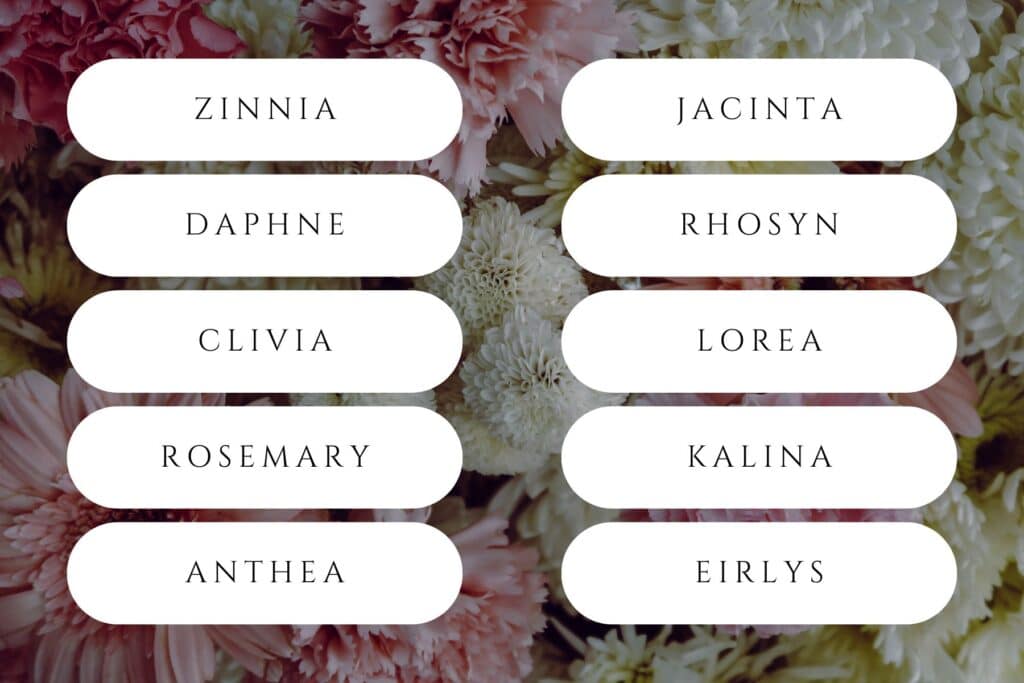
Zinnia
Origin: Latin; German
Meaning: Zinn’s flower
Zinnia, pronounced ZIN-ee-uh, takes its name from the colorful flower that was named after German botanist Johann Gottfried Zinn (1727-1759). They belong to the same family as asters, daisies and sunflowers.
Daphne
Origin: Greek
Meaning: Laurel; Evergreen shrub with flowers
Daphne, pronounced DAF-nee, comes directly from the Greek word daphne, meaning “laurel.” In Greek mythology, Daphne is a Naiad-nymph who was turned into a laurel tree to escape the pursuit of Apollo.
Clivia
Origin: Latin; Old English
Meaning: Trumpet-shaped flower; Cliff
Clivia, pronounced KLIH-vee-uh, comes from the popular houseplant known for its trumpet-shaped flowers and glossy, dark green, strap-like leaves. It was named after Charlotte Florentina Clive, whose last name means “cliff” in Old English.
Rosemary
Origin: Latin; Hebrew
Meaning: Rose of the sea; Bitter rose
Rosemary, pronounced ROHZ-mair-ee, is a combination of the names Rose, referring to the red flower, and Mary, which comes from the Hebrew name Miriam and is believed to mean “of the sea” or “bitter.”
Anthea
Origin: Greek
Meaning: Flower; Blossom
Anthea, pronounced AN-thee-uh, comes from the Greek name Antheia and Greek word anthos, meaning “flower” and “blossom.” In Roman mythology, Anthea was an epithet of Hera, the Queen of the Gods.
Jacinta
Origin: Spanish; Portuguese; Greek
Meaning: Hyacinth flower
Jacinta, pronounced juh-SIN-tuh or hah-SEEN-tah (Spanish), is the Spanish and Portuguese feminine form of Hyacinthus, which is a Greek name derived from the hyacinth flower. In Greek mythology, Hyakinthos was accidentally killed by the god Apollo.
Rhosyn
Origin: Welsh
Meaning: Rose
Rhosyn, pronounced ROH-sheen, comes from the Welsh word rhosyn, meaning “rose.” Other rose variants include Rosie, Rosalie, Rosanna, Rosabella, Rosetta, Rosina, Roseanne, Rosaria and Rosalba.
Lorea
Origin: Basque
Meaning: Flower
Lorea, pronounced loh-RAY-uh or lor-EE-uh, is a variant of Lore, which comes from the Basque word lore, meaning “flower.” It can also be a diminutive of Lorena, which means “the army’s kingdom” in German.
Kalina
Origin: Latin; Slavic
Meaning: Viburnum tree; Flower cluster
Kalina, pronounced kuh-LEE-nuh, comes from the Slavic word kalina, referring to the viburnum tree known for its white and cream-colored flowers that often have flat-topped or rounded flower heads.
Eirlys
Origin: Welsh
Meaning: Snowdrop; Drooping flower
Eirlys, pronounced EYE-lis or, less commonly, EER-liss, is composed of the Welsh elements eria, meaning “snow,” and llys, meaning “plant.” It refers to the snowdrop known for its drooping bell-shaped flowers.
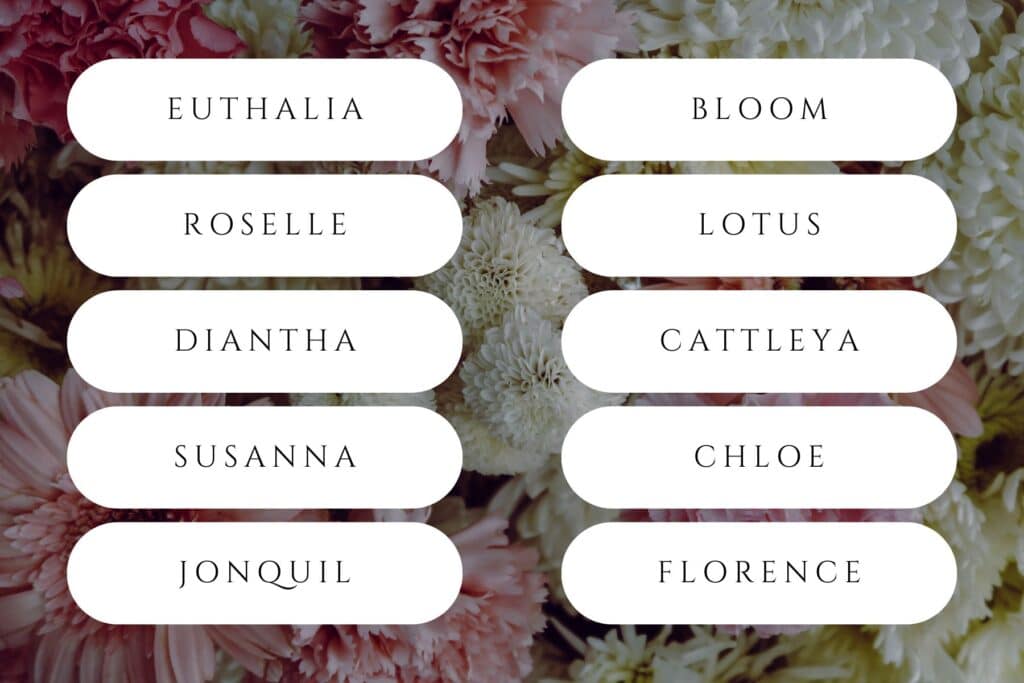
Euthalia
Origin: Greek
Meaning: Good bloom; Flourishing
Euthalia, pronounced yoo-THAY-lee-uh, comes from the Greek word euthaleia, which is composed of the Greek elements eu, meaning “good,” and thallo, meaning “to blossom.” It translates to “good bloom.”
Roselle
Origin: Latin
Meaning: Little rose; Tropical plant
Roselle, pronounced ROH-zell, is another diminutive of Rose, which comes from the Latin word rosa, referring to the red flower. Roselle is a tropical plant often used to make hibiscus tea, jams and sauces.
Diantha
Origin: Latin; Greek
Meaning: Divine flower; Pink
Diantha, pronounced DYE-an-thuh, comes from the name of a flower known for its fringed or frilly-edged petals. It comes from the Greek word dianthus, which is composed of the elements dios, meaning “divine,” and anthos, meaning “flower.”
Susanna
Origin: Greek; Hebrew
Meaning: Lily; Rose
Susanna, pronounced soo-ZAN-uh, comes from the Hebrew name Shoshanna, which derives from the Hebrew word shoshan, meaning “lily.” In modern Hebrew, shoshan also means “rose” or “red flower.”
Jonquil
Origin: English; Latin
Meaning: Type of daffodil
Jonquil, pronounced JAHN-kwil, comes from the name of a type of daffodil (narcissus) known for its small, fragrant yellow or white flowers, typically with multiple blooms per stem and a short cup in the center.
Bloom
Origin: English
Meaning: Flowers; Growth
Bloom, pronounced BLOOM, comes directly from the English word bloom (derived from the Old Norse word blomi), which means “to produce or yield flowers” or “to support abundant plant life.”
Lotus
Origin: English; Greek
Meaning: Lotus flower; Sleepy; Forgetful
Lotus, pronounced LOH-tis, comes from the name of the lotus flower and lotus tree derived from the Greek word lotos. In Greek mythology, the lotus tree was known for its fruit that caused sleepiness and forgetfulness.
Cattleya
Origin: English
Meaning: Cattley’s flower
Cattleya, pronounced cat-uh-LAY-uh, comes from the cattleya flower, also known as Corsage Orchid, a popular and showy orchid genus native to tropical America. It was named after British horticulturist William Cattley.
Chloe
Origin: Greek
Meaning: Young green shoot; Blooming; Harvest goddess
Chloe, pronounced KLOH-ee, comes from the Greek word khloe, meaning "young green shoot" or "blooming." In Greek mythology, it was an epithet of Demeter, the goddess of the harvest and agriculture.
Florence
Origin: Latin
Meaning: Flourishing; Blossoming
Florence, pronounced FLOR-ints, comes from the Latin name Florentius and Florentia, which derive from the Latin word florens, meaning “flourishing” or “blossoming.” It’s also the name of a major city in Italy.
Myrtle
Origin: Latin; Greek
Meaning: Star-shaped flower
Myrtle, pronounced MUR-tuhl, comes from the name of an evergreen bush with white, star-shaped flowers with long stamens and purple-black berries. It ultimately comes from the Greek word myrtos.
Go Beyond Flower Names for Girls With These Nature Names

Flower names for girls are just a fraction of what nature names have to offer for your daughter.
Just take one look at the Latin name Olivia, which has been the No. 1 most popular girl’s name in the United States every year since 2019, according to the SSA.
Luna (13th), Violet (15th), Aurora (16th), Hazel (19th) and Lily (24th) also ranked in the SSA’s top-25 in 2024.
You can also go with an animal name like Birdie, a water-inspired name like Isla, a weather-inspired name like Stormi, a season-inspired name like Dawn or a gemstone name like Amethyst.
Earth- and land-inspired names like Tierra, Gaia and Sierra are also in use today.
Nature names — especially flower girl names — are more than just a pretty sound and beautiful meaning. They provide the beauty, significance and individuality that many parents are looking for in a name.
ALSO ON MOD MOMS CLUB: YouTuber Trisha Paytas reveals the unique baby names she considered for son Aquaman
But if flower girl names aren’t what you’re looking for, then don’t worry. You can use Mod Moms Club’s baby name generator to narrow your baby name list down to the names that mean the most to you.












